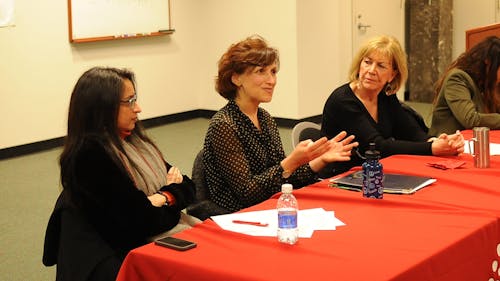Rutgers professors discuss infringement on academic freedom at University

Over Thanksgiving break, Deepa Kumar headed to a movie theater to watch Trumbo, a biographical film about Hollywood screenwriter Dalton Trumbo, who was blacklisted in 1947 for his political beliefs.
The film struck Kumar, a professor in the Department of Journalism and Media Studies, who but herself was targeted over the summer for a tweet that said, “Yes, ISIS is brutal, but U.S. is more so … #NoToWar.”
FOX News and various other conservative media outlets ran stories condemning Kumar’s tweet, and a campaign later called for the removal of Kumar from the University.
“FOX picked it up, and decided to do a piece about how this professor at a public university is corrupting young students on campus,” Kumar said.
The incident, Kumar believes, brought the issue of academic freedom into question.
Kumar was only 1 of 4 panelists who spoke at an event hosted by the Rutgers American Association of University Professors-American Federation of Teachers, titled “Silencing Dissent: Why Academic Freedom Matters,” on the afternoon of Dec. 3 in Alexander Library on the College Avenue campus.
Not only did Kumar say she received hundreds of phone calls and emails, but she also was subject to deaths threats. The response serves as proof that academic freedom is being stifled by universities, she said.
“I decided I’m not going to take this sitting down, and that I have a union that would have my back,” she said. “It’s our job to reclaim the University as a democratic university … The Hollywood blacklist ended because people fought back.”
But Kumar is not the only Rutgers professor who feels that their academic freedom is being constrained.
Julia Sass Rubin, an associate professor at the Edward J. Bloustein School of Planning and Public Policy, experienced curtailment of her academic freedom last October.
Last year, Rubin published the first part of a three-part study on the demographics of charter schools. The report used public data to show students with learning disabilities, limited English proficiency and those who come from low-income households are underrepresented in New Jersey charter schools.
In response to the study, "New Jersey Charter Schools: A Data-Driven View," the New Jersey Charter Schools Association filed an ethics complaint with the New Jersey State Ethics Commission.
The ethics complaint charged her with using her position, title and university resources to bring legitimacy to the report. Being a founder of Save Our Schools N.J., an organization that "believes all New Jersey children should have access to high quality education," the complaint also charged Rubin with having a personal agenda, Rubin said.
She called the ethics complaint a "slap suit," and considered it an infringement on her academic freedom. In response, she got in touch with AAUP-AFT to fight back.
"They provided me with top-notch legal talent," she said. "We filed a counter statement of what actually transpired. The State Ethics board took about six months, and then said they have no authority over this and returned it back to Rutgers."
The second part of her study was recently published.
"Those who have the ability to speak have an obligation to speak," she said. "I certainly will not be shutting up."
And professors at colleges outside of New Jersey are also speaking up.
Divya Nair, an adjunct professor of English at the Community College of Philadelphia, joined the three other Rutgers panelists to discuss her own experiences with academic freedom.
Nair's own story played out in October, when her and a group of students and faculty interrupted police recruitment in the cafeteria of the school. The college invited police officers to table in the cafeteria in order to find more diverse recruits for the police department.
Nair, and others, saw this as a predatory practice, and said the recruiters were looking for students with a C average.
After rallying inside of the cafeteria, the incident ended with the administration intervening and threatening to fire Nair.
"(They said) if you're a faculty member here and you're doing this, you're in violation, and you're going to be out of here," she said. "I was told the protest was illegitimate, which defeats the purpose of protesting."
Hours later, Nair was suspended until further notice without pay.
David Hughes, a professor in the Department of Anthropology, said a recent incident at Rutgers sheds light on a failed policy of academic freedom.
"Our former football head coach, once known as Kyle Flood, asked a part-time lecturer to change the grade of a failing student," he said. "What emerged in the course of the investigation was that this instructor had felt intimidated. She began to comply, met with Kyle Flood and was designing an extra assignment."
Eventually, someone blew the whistle, shedding light on a failed system, Hughes said.
"This is a question of academic freedom, because one of the ways in which we exercise our judgement as professors is in evaluating student work and assigning it the grade it earned," he said. "This is possibly for students the most important form of academic freedom, because the value of their degree rests upon the ability of the faculty to exercise that judgement."



